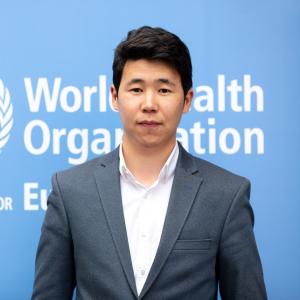WHO, together with national partners, has conducted distance learning in Kyrgyzstan for laboratory specialists in diagnosis of COVID-19 coronavirus infection
13 April 2020
E-learning training cycles in diagnosis of COVID-19 coronavirus infection were completed in Kyrgyzstan for 96 laboratory specialists. This distance training has engaged the local Polymerase Chain Reaction method (PCR) experts from the National TB Center, AIDS Centers, Republican Center for Quarantine & High Pathogen Infections, State Centers for Sanitary and Epidemiological Surveillance of Bishkek, Jalal-Abad, Osh, Issyk-Kul regions and private laboratories.
The main goal of the e-learning courses was to train laboratory specialists in the basics of Biosafety in laboratory settings and in working with high pathogen and dangerous materials. The participants were presented a series of training videos, developed by WHO in the fundamentals of biosafety and PCR testing for COVID - 19, collection, transportation, processing and preparation of samples for further testing.
The distance training covered the basics of PCR tests, regulatory framework as well as regulating the activities of laboratories in the area of COVID-19 diagnosis. Also the training materials and programs on COVID-19 were revised for health workers in Kyrgyzstan.
In March, over 310 health workers from ICUs, Republican Infectious Diseases Hospital, PHC Centers and 2 Military Hospitals attended the two-day specialized training in Clinical Management of COVID-19 patients.
WHO is also planning to make an urgent procurement of necessary PCR supplies for COVID-19 testing for the laboratories of Kyrgyzstan; soon WHO will arrange referral of positive samples to the Regional Reference Laboratory in England for confirmation and phylogenetic tests of coronaviruses, circulating in Kyrgyzstan.
Information: this assistance is provided as part of the joint humanitarian response under the Disaster Response Coordination Unit, which was activated on 16 March 2020 following the request of the Government to assist her in emergency preparedness and response for COVID-19 and setting a stage for early recovery. Chaired by the UN Resident Coordinator, the DRCU prioritizes and channels its support under six priority sectors: early recovery, education, food security and logistics, health, protection, and joint sector for water sanitation and hygiene (WASH) and non-food items (NFI). The DRCU was set up in 2008 and its inter-agency teams comprise representatives of government ministries, UN agencies, international and local NGOs and representatives of donor community.



